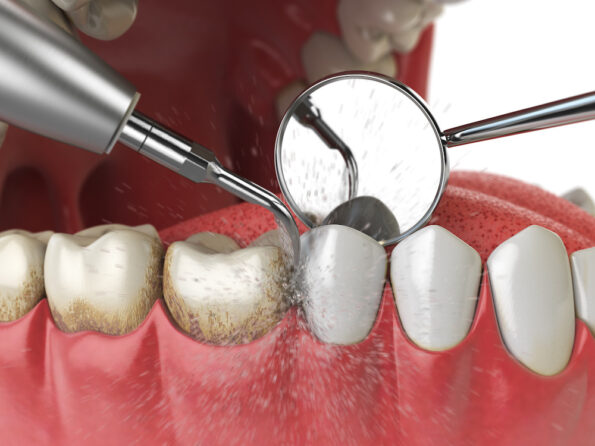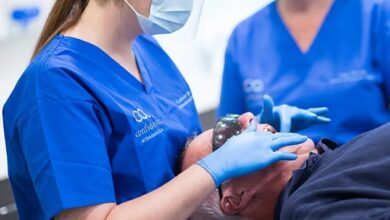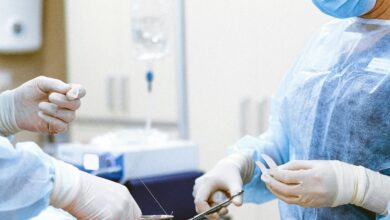How To Deep Clean Teeth At Home | A Guide

Clean teeth aren’t just for a bright smile. They’re also for good oral health. Due to the high cost of dental treatments in the USA, it is important to adopt effective at-home cleaning methods. If you want to keep your teeth plaque-free and your gums healthy, a proper deep cleaning routine can make all the difference.
This guide will walk you through proven techniques for deep cleaning your teeth at home. We’ll cover simple yet effective practices that go beyond basic brushing, helping you maintain strong and healthy teeth.
The Key To Effective Deep Cleaning
Here’s how you can achieve a dentist-level cleanup at home:
Mastering The Right Brushing Technique
Brushing your teeth the right way is just as important as how often you do it. Many people brush daily but still experience plaque buildup due to improper technique. Using excessive force while brushing can erode enamel and cause gum recession, leading to sensitivity and other dental issues.
The Best Toothbrush Selection
A soft-bristled toothbrush is ideal because it effectively cleans without damaging your gums. Electric toothbrushes can provide a deeper clean compared to manual ones. When brushing, hold the toothbrush at a 45-degree angle to clean along the gumline. Brush for at least two minutes, covering all tooth surfaces, and use fluoride toothpaste to strengthen enamel and prevent cavities.
Brushing The Right Way
- Hold the toothbrush at a 45-degree angle to clean along the gumline.
- Brush for at least two minutes, covering all tooth surfaces.
- Use fluoride toothpaste to strengthen enamel and prevent cavities.
- Teeth Whitening in Istanbul – Lema Dental Clinic
Natural Methods To Improve Oral Hygiene
Adding these natural cleaning methods to your routine can significantly enhance your oral health:
Oil Pulling
Oil pulling is an ancient practice that helps remove bacteria and toxins from the mouth. To perform oil pulling, take a tablespoon of coconut or sesame oil and swish it around in your mouth for 10-15 minutes. This process helps pull harmful bacteria and plaque from hard-to-reach areas in the mouth. Once done, spit the oil out and rinse your mouth with warm water before brushing your teeth.
Flossing
Since brushing only cleans the surface of your teeth, flossing is necessary to eliminate plaque buildup between them. When food particles get trapped between teeth, they can lead to bad breath and increase the risk of cavities. Flossing helps eliminate these trapped particles, preventing bacterial growth and keeping your breath fresh.
This dentist in Geneva IL adds that daily flossing is a primary defense against gingivitis and more advanced gum disease. By removing debris that a toothbrush cannot reach, you protect the delicate gum tissue from inflammation and ensure a truly comprehensive clean for your entire mouth.
Tongue Cleaning
Your tongue harbors bacteria and food particles that contribute to bad breath and plaque buildup. Cleaning your tongue daily helps remove these bacteria, leading to fresher breath and improved oral hygiene. Using a tongue scraper or the back of your toothbrush, gently clean the surface of your tongue from back to front to remove debris and bacteria.
Specialized Tools For A Deeper Clean
Some areas in your mouth require more than just a toothbrush and floss. The following right tools can make a huge difference in your cleaning routine:
Interdental Brushes And Dental Picks
If traditional flossing feels difficult, interdental brushes and dental picks are great alternatives because:
- They effectively remove plaque between teeth and around dental work.
- They are perfect for people with braces, implants, or tight gaps.
- Regular use helps prevent gum disease and cavities.
The Role Of A Dental Sterilizer
Keeping your oral care tools clean is just as important as using them correctly. A dental sterilizer helps eliminate bacteria from toothbrushes, interdental brushes, and dental picks. Also,
- It extends the lifespan of your oral hygiene tools.
- It ensures a bacteria-free cleaning routine.
- It reduces the risk of reinfection from unclean tools.
Lifestyle Habits That Support Dental Health
The following are some daily lifestyle habits that can benefit your dental health:
Drinking Enough Water
Water plays a crucial role in oral health by washing away food particles and bacteria, reducing the risk of plaque buildup. Staying hydrated also prevents dry mouth, which can lead to bad breath and an increased chance of cavities. Additionally, drinking fluoridated water strengthens enamel and helps protect teeth from decay.
Eating The Right Foods
The foods you eat directly impact your dental health, making it important to choose tooth-friendly options. Crunchy fruits and vegetables like apples and carrots naturally clean teeth by scrubbing away plaque, while dairy products such as cheese and yogurt provide calcium to strengthen enamel. Nuts and seeds are also beneficial as they contain minerals that support gum health and help prevent inflammation.
Improving Visibility With Dental Lights
Proper lighting is often overlooked but plays a significant role in maintaining oral hygiene. Using dental lights allows you to see hidden plaque and tartar buildup, ensuring a more effective brushing and flossing routine. With better visibility, you can target problem areas, leading to improved oral health and a cleaner smile.
Using The Right Mouthwash
Mouthwash isn’t just for fresh breath, it plays a key role in oral hygiene by killing bacteria and strengthening enamel. When selecting a mouthwash:
- Choose an alcohol-free formula to avoid dry mouth.
- Look for one with fluoride to protect against cavities.
- Use antibacterial mouthwash to reduce plaque and gingivitis.
When To See A Dentist
While deep cleaning at home is very important, some dental issues require professional care. Visit a dentist if you experience:
- Persistent bad breath despite good hygiene.
- Bleeding or swollen gums.
- Tooth sensitivity or pain.
- Visible tartar buildup that doesn’t go away with brushing.
Conclusion
Deep cleaning your teeth at home is a crucial step toward maintaining oral health. By using the right brushing techniques, incorporating flossing, trying oil pulling, and using tools like interdental brushes and dental picks, you can achieve a thorough clean. Additionally, maintaining hydration, eating tooth-friendly foods, and ensuring proper lighting with dental lights can further enhance your routine.
Prioritizing these steps can help you avoid costly dental procedures while keeping your teeth and gums healthy. Take action today and build a routine that keeps your smile strong and bright.




